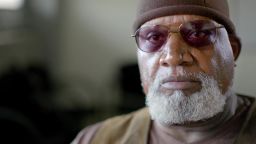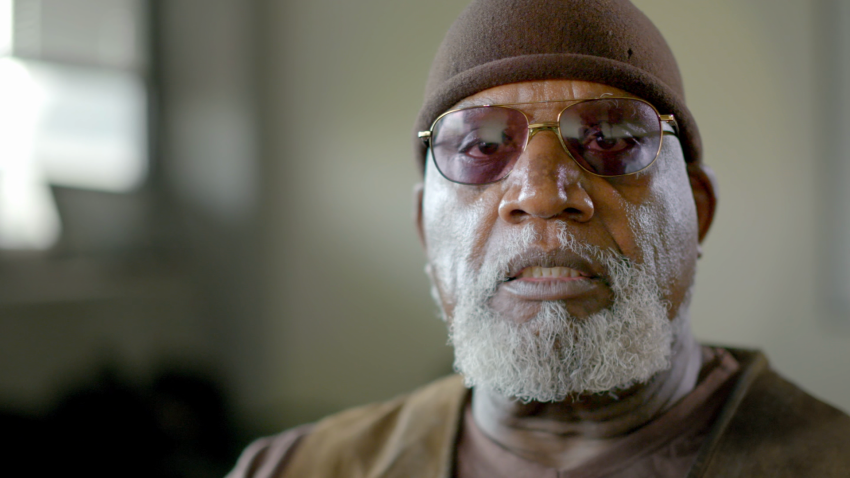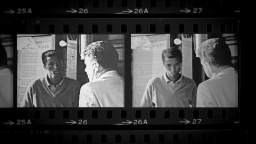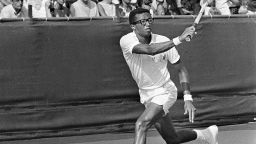Editor’s Note: Stephanie Griffith is an opinion editor at CNN.com. Read more opinion articles on CNN.
Arthur Ashe was much more than a gifted athlete on the tennis court: He fought to open doors for African Americans in his sport and was active in the fight to end apartheid in South Africa. He was also deeply engaged in the campaign to de-stigmatize AIDS, the illness that ultimately took his life in February 1993 at the age of 49.
Born in 1943, Ashe was brought up in the segregated south in Richmond, Virginia. He first picked up a racket on Blacks-only municipal tennis courts in that city. He attended the University of California, Los Angeles (UCLA) on a tennis scholarship and in 1963 became the first African American to represent the United States in the Davis Cup.

Ashe made history as the first Black man to win a Grand Slam tournament. He won his first Grand Slam title at the 1968 US Open and his second at the 1970 Australian Open. Ashe’s third and final Grand Slam crown came at Wimbledon in 1975.
But the CNN film “Citizen Ashe” focuses on an under-appreciated aspect of Ashe’s illustrious career: his role as an activist and civil rights advocate.
Harry Edwards – sociologist, educator, professor emeritus at the University of California at Berkeley and documentary film producer – was also a confidant of Ashe’s. He spoke in the film about the legacy of his late friend, who was not just one of his sport’s greatest players but also a committed social justice advocate.
Edwards is one of the foremost authorities on African Americans in sport. He is perhaps best known for his founding role in the Olympic Project for Human Rights, which orchestrated the historic Black power salute protest during the 1968 Olympics in Mexico City by track and field athletes Tommie Smith and John Carlos. He is also the author of “The Revolt of the Black Athlete,” a seminal work about Black activism on the playing field and in the athletic arena.
Stephanie Griffith, an opinion editor at CNN, interviewed Edwards about his decades-long friendship with Ashe and the tennis great’s legacy as a humanitarian and activist. This interview has been condensed and lightly edited for clarity.
CNN: Over time, Arthur Ashe came to be among your closest friends, but you were decidedly less than impressed by him initially. The film shows that before you really got to know him – when he was a college student at UCLA and in his early days playing professional tennis – you were put off by his reserved demeanor and somewhat conservative personal style. What led to the change in how you viewed him?
Edwards: When I first approached Arthur Ashe in 1968, I had known of him, of course. He was already a great tennis player and I was aware of him in my work as a sports scholar. But I did not personally know Arthur Ashe.
He was often at these lily-white clubs. He was the only Black tennis player in most of the events that he was involved in. When I approached him about supporting the Olympic Project for Human Rights, he said, “I respect what you’re doing. I understand what you’re doing, but that’s not my way.”
I was put off by him. But as I got to know him better, I came to understand that like so many people, I had prejudged him. I had presumed to know him too soon.
CNN: And what was the real Arthur Ashe like?
Edwards: First of all, he was absolutely brilliant. Secondly, he was courageous – more so than some of the more militant people at the time. He had a sense of character that was rare. While most of us were raising a fist, he was extending a hand – not just to friends, but to his adversaries. He was a person who had a vision. While many of us were talking about Pan-Africanism, he was practicing it with his activism in South Africa.
Dr. Martin Luther King Jr. said that injustice anywhere is a threat to justice everywhere – and Arthur was practicing it. He could see the connection between what was going on in South Africa and what was happening here, and he organized athletes and artists in this country to fight injustice in South Africa. He broke the color barrier by playing at a tournament in South Africa.
He protested racism here and abroad. He saw the connection clearly, but he would not be deterred – much less derailed – from his commitments, because of the trajectory and substance of the Black Power movement that was going on at the time.
It took me a while to take all of that in. But eventually, over the years, I had no more valuable ally, mentor or associate, than Art. He would call me up in the middle of the night sometimes on the phone just to talk.
CNN: What would he have made of the fact that while there are any number of Black women tennis players, he remains a singular figure, in terms of Black American male Grand Slam tennis champions?
Edwards: I think that Arthur understood the environment that he was moving in. He fought the battles that he could win on the issues of race. But the issue of Black male participation (in tennis) was a bridge too far.
There’s a reason why you haven’t had up until this point another Black male tennis player of Arthur Ashe’s stature. Everything that has taken place in terms of creating change of a progressive nature involving race in America has been transactional.
And even though he started and participated in programs to generate opportunities in tennis for Black males and females coming up through the ranks, he did not have the transactional leverage to make that happen on his own.
For instance, what got Jackie Robinson into Major League Baseball was not brotherhood. It was business: There was a manpower shortage coming out of World War II that Branch Rickey – the acute businessman that he was – understood. So it’s complicated terrain that we move over when we begin to try to understand race relations in sports.
Nothing in the area of social justice happens simply because it is morally correct, constitutionally appropriate or ethically right. Arthur was aware of that. He and I talked about that – about him being out there literally by himself for his entire career.
CNN: And you would say the same that applies to Black athletes in a sport like golf, where there really hasn’t been a lot of diversity either?

Edwards: Absolutely. I mean, at one time people were talking about how Tiger Woods is going to open up this and that and the other for Black golfers and so forth. I knew at the time it was nonsense.
There is no transactional leverage that would bring that about: The white golfing structure is quite satisfied to be able to point to Tiger Woods and maybe one or two other golfers further down the status and ranking chain who happen to be Black. But there’s not going to be any pipeline of Black golfers as there was a pipeline of Blacks going into basketball, or a pipeline of Blacks going into football.
CNN: You talked about how your feelings evolved over time, in terms of your understanding of who Arthur Ashe was. But I assume that he too evolved over the years?
Edwards: Absolutely. Arthur, I think, became not just a committed, courageous, conscientious advocate. He became more of an activist in his last years. Even when he knew he was dying, he got arrested at a protest.
That was not something that was really part of his character in his earlier years. He was an advocate, he looked for reason and rational resolution by reaching out not just to friends and those who agreed with him, but by reaching across the barricades to those who did not agree with him. He believed with earnest conviction in reasoned discussion – that it’s always best to reach out with an outstretched hand rather than with a clenched fist.
But as he grew older, he became more convinced, I think, that militancy had its virtues. And he began to exhibit more of that – even to the point of being arrested at demonstrations late in his life.
He took an interest not just in race and ethnic and gender relations in America, but in the world. His fight for equity and justice in South Africa was so determined and so powerful that when they asked Nelson Mandela (in 1990) who would he like to be there when he walked out of prison, his response was, “How about Arthur Ashe?”
CNN: There’s a clip in “Citizen Ashe” that shows Barack Obama talking about the athletes who inspire him most. He named two: Arthur Ashe and Muhammad Ali. Ali makes almost everybody’s list. Why do you think people don’t invoke the name of Arthur Ashe more often?
Edwards: Because they don’t know him, and because they presume to know him. But Arthur was a deep dive. He wasn’t like (civil rights activist) Stokely (Carmichael). He wasn’t like Malcolm X. He wasn’t even like Dr. King.
Arthur was a deep dive into who he was, what he was, what he stood for, what he believed in – and he had the courage, commitment, intellect to pursue it. And most people move not on the basis of deep dives; they move on the basis of first impressions. But as I got to really know him, I realized that he was one of the members of the pantheon of immortals in terms of sports activism in the 20th century.
I put him in the same pantheon with Bill Russell, with Elgin Baylor, who walked out of the game in 1960 over discrimination and racism in in the south when he was playing with the Los Angeles Lakers. I put him in the same category, of course, as a Muhammad Ali, Smith and Carlos, Jackie Robinson and Kareem Abdul Jabbar – all of these great activist athletes.
He’s part of that pantheon of sports figures who had an impact beyond the arena. Arthur is right there with them.








